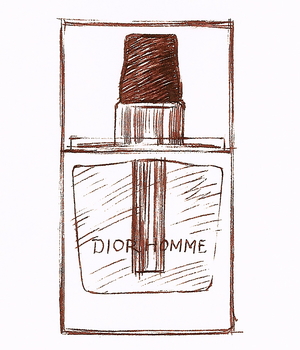Tagged With ‘1932’
Christian Dior
Dior Homme
19 May, 2014
 We all have blind spots, and Dior Homme has definitely been one of mine. I was, very kindly, given a bottle some time ago, and I admired its clear glass-and-lucite design, but as for the perfume inside – I just didn’t get it. It had excellent reviews, and it obviously sells well, so I thought I’d better give it another try.
We all have blind spots, and Dior Homme has definitely been one of mine. I was, very kindly, given a bottle some time ago, and I admired its clear glass-and-lucite design, but as for the perfume inside – I just didn’t get it. It had excellent reviews, and it obviously sells well, so I thought I’d better give it another try.
Still no luck, I’m afraid. It’s not horrible (which is a rarer attribute than you might expect), but neither does it make me go ‘WOW!’, which is the response I’m always hoping for. There’s a hint of something in it that I really don’t like, which it shares with a lot of other men’s fragrances today – a slightly metallic, chemical smell, which might come from dihydromyrcenol or perhaps from ISO E Super, both (ab)used with gay abandon by contemporary perfumers.
So why the brilliant reviews? Am I just completely missing something? Actually, I suspect not. Although it was only launched in 2005, it seems that the original scent might well have been tinkered with and reformulated (quite possibly more than once), meaning that the bottle I have probably smells very little like the much-admired original. Which is a shame, as it did sound very appealing, not least because it was created by the talented Olivier Polge, son of Chanel’s legendary in-house perfumer Jacques Polge.
Whatever the truth of the matter, the version I have and the original do seem to share at least one interesting quality. I’ve pointed out before that in itself perfume is genderless – how can a liquid be ‘masculine’ or ‘feminine’? But there are definitely some ingredients and effects that, at least historically, have been more closely associated with women or men. Vetiver, for example, is considered a classic ‘male’ smell, while iris is widely regarded as and ‘feminine’ and ‘floral’ (even though the scent is extracted not from iris flowers but from its roots).
As its name far from subtly suggests, Dior Homme is aimed squarely at men, yet its main smell, even in my rather synthetic-smelling version, derives from iris; compare it with Chanel’s superlative 1932 and you’ll see what I mean. Either this shows that contemporary men are more sophisticated than some might say, or they’re dumb enough to believe anything they’re sold. I like to think the former, but maybe I’m deluding myself; what do you think?